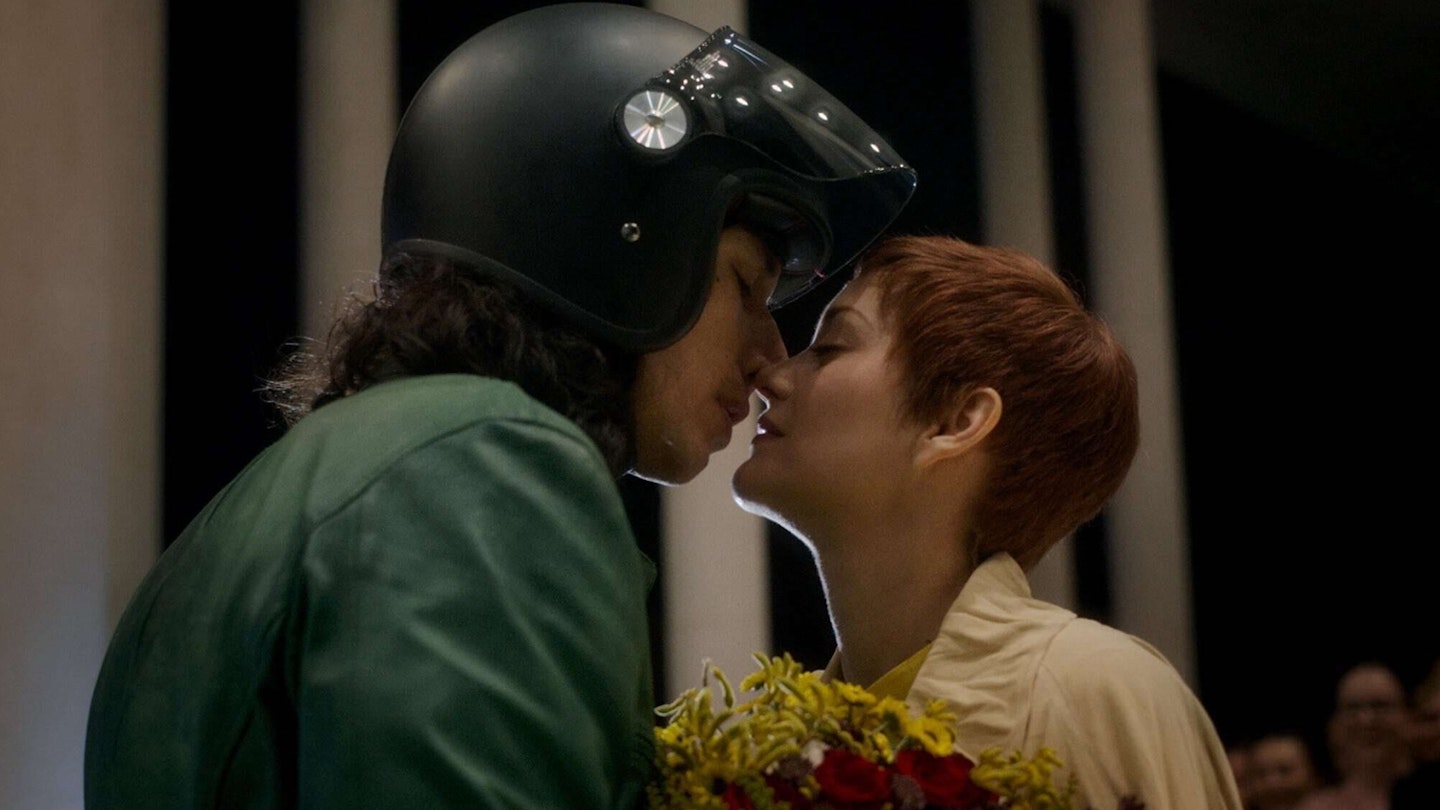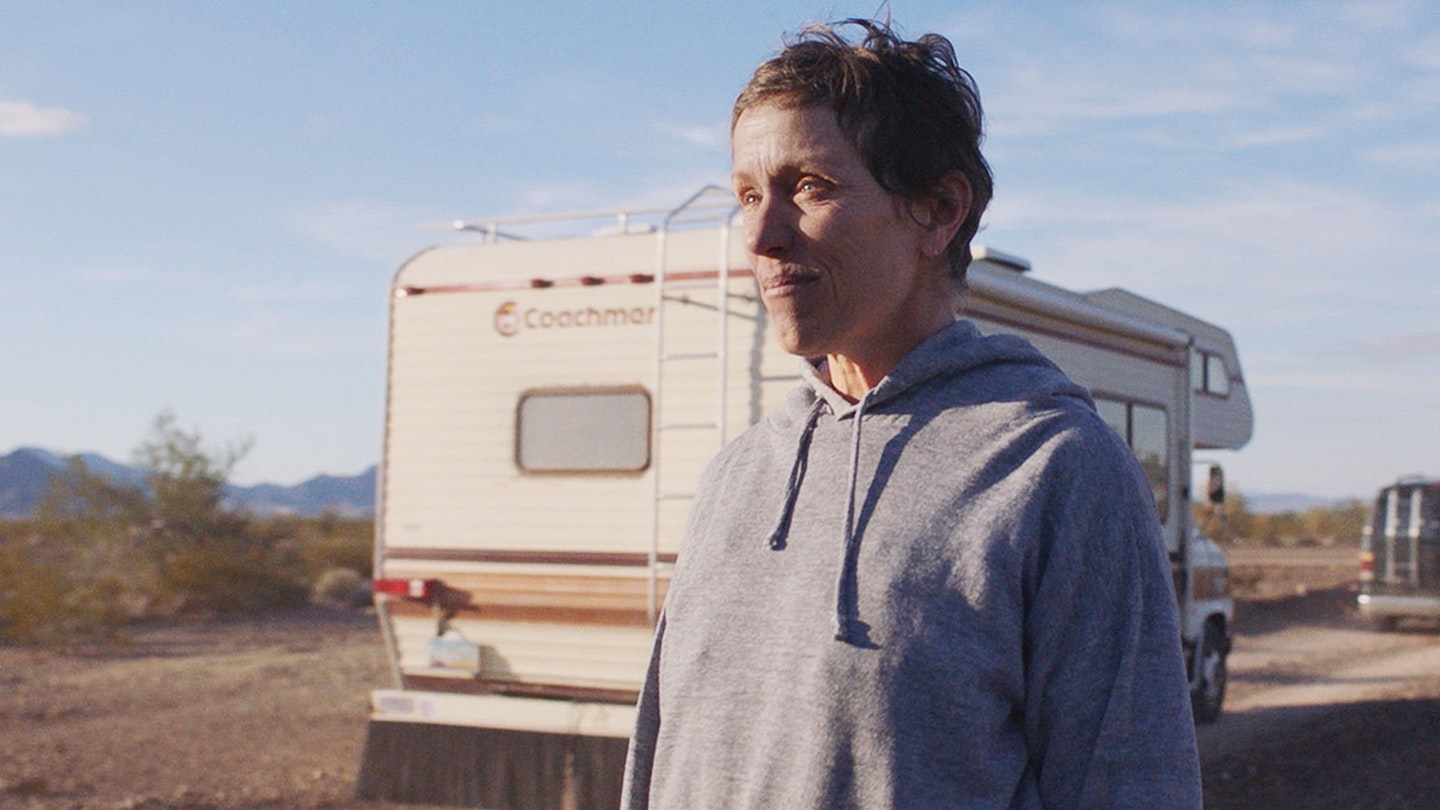If you know one thing about Annette, it’s probably that Adam Driver sings a tender, gorgeous love song (‘We Love Each Other So Much’) to Marion Cotillard’s foo-foo. It happens twice, but still doesn’t break the top five moments of weird shit that happen in Leos Carax’s wild-at-heart, batshit-on-top phantasmagoric opera. Annette is unlike any other film in 2021 or any other year. Driven by Ron and Russell Mael’s, aka Sparks’, demented rhythms and lit up by Driver’s unhinged energy, it sails on the melding of its idiosyncratic talents to blow up an oft-told tale of showbiz people undone by professional jealousy, spun with wit, oversized emotions and lashings of cinematic brio.

From Denis Lavant sprinting and cartwheeling down a Parisian street to David Bowie’s ‘Modern Love’ in Mauvais Sang — a moment gloriously homaged by Greta Gerwig in Frances Ha — to a pixie hair-cutted Kylie Minogue’s torch song ‘Who We Were’ in Holy Motors, Carax’s films have showcasing songs in their DNA. Annette sees the filmmaker finally scratch a musical itch that has been there all along. It starts with an absolute banger. Building on Holy Motors’ barnstorming procession of according players, ‘So May We Start’, a typically propulsive Mael composition, sees an on-screen Carax assemble Sparks and his cast to march in a virtuoso oner out of the studio and into Santa Monica, singing a delirious, self-reflexive ear-worm (“The budget is large, but, still it’s not enough”) so good you fear the film will never recover. It does.
Driver is Henry McHenry, a stand-up comedian-performance artist who prowls the stage in a boxer’s robe. He’s a raging bullshitter, a provocateur (Driver special-thanks Bill Burr and Chris Rock in the end credits), making jokes about gas chambers and self-immolation, initially with the audience eating out of the palm of his hand. He is one half of an unlikely power couple, with Ann Defrasnoux (Marion Cotillard), an on-the-up opera star with a penchant for red wigs and wind machines. Soon the giving head and late-night motorbike-rides give way to professional jealousy, drunken rages, violent outbursts and #MeToo accusations, all parlayed by TMZ-style news reports played out as a Greek chorus.
After the wooden star is born, both Annette and _Annette_ blast off into another zone of madness altogether.
Given it has the contours of a backstage musical — one star shines, the other dims — plot-wise things start to feel more conventional than the nutso Holy Motors (which incidentally features Sparks’ song ‘How Are You Getting Home?’). It’s here Carax plays his joker. Ann gives birth to Annette, a literal Chucky-esque puppet blessed with the singing voice of an angel. After the wooden star is born, both Annette and Annette blast off into another zone of madness altogether (yes, that is a morose gorilla).
Although it keys into the ill-fated romanticism of early works like Boy Meets Girl and Les Amants Du Pont-Neuf — few filmmakers have embraced the pain of lost love as a theme as fulsomely as Carax — Annette is really a film about how true love can come undone by (male) egotism run rampant. The effects of Henry’s self-absorption, both as the fuel for his art and the Achilles heel in his relationships, run deep. It’s easy to see Henry as a portrait of the artist, and for all the bonkers frippery on show, there’s a force of feeling to Annette suggesting a filmmaker duelling with his demons.

This passion means Carax is cinematically on fire, creating a style that is at once lyrical and loony. Working with regular cinematographer Caroline Champetier, Carax creates a hermetically sealed world in impressive set-piece after impressive set-piece, roaming from a theatrical stage opening up to become an enchanted forest to a boat caught in a raging, rear-projected tempest, to a stadium populated by tens of thousands for Baby Annette’s first performance. Carax also seemingly throws out virtuoso imagery at will: a moment where Ann’s accompanist (Simon Helberg) spouts expository dialogue while conducting an orchestra as the close-up camera does extravagant circles around him out-Scorsese’s Scorsese. There is cheekiness in the edit too. During Henry and Ann’s second sesh of cunnilingus, Carax employs an audacious match cut that segues from the full-throated moans of oral sex to the full-throated groans of childbirth, all as a chorus of doctors and nurses chime, “Breathe in! Breathe out! Breathe in!”
It’s this sense of playfulness, plus a zeal for mashing up highbrow (an opera star) and trash (a comic), that make Carax and Sparks such fruitful bedfellows. Save Henry’s comic stylings, there is no spoken word in the film, and the score is sung-through (think Les Misérables), thriving on simple rhymes and a heavy use of repetition, often cycling through variations on the same phrase (‘Six People Have Come Forward’, a staccato hymn to calling out toxic male behaviour) that become anthemic. It helps that both the film’s stars have musical chops, demonstrated by Driver in Inside Llewyn Davis and his rendition of ‘Being Alive’ in Marriage Story, Cotillard in musical Nine and her own recording career. Lyrically, the songs flit between the brazenly sincere, the tongue-in-cheek and the darkly sardonic. Musically, the score runs the gamut from dark classicism to beautiful arias, from minimalism to belligerent rock opera. And when it’s time for the film to deliver its big emotional payload, the brothers strip away the irony to deliver something truly heart-rending.
If the film has a fault, it lies in Carax’s complete disinterest in Ann, giving the immense Cotillard very little to do outside of her operatic scenes, the screenplay lending little insight into her inner life. In the second half, the excellent Helberg comes more to the fore as Ann’s wannabe lover with suspicions about Henry but, performance-wise, the film belongs to Driver. Arguably the most distinctive actor working today, he gives Henry McHenry such disarming vigour and shattering intensity, it’s like watching Magnolia’s Frank T.J. Mackey if he could carry a tune. A perfect Carax doomed lover, watching him stare into the abyss, you can’t take your eyes off him.




